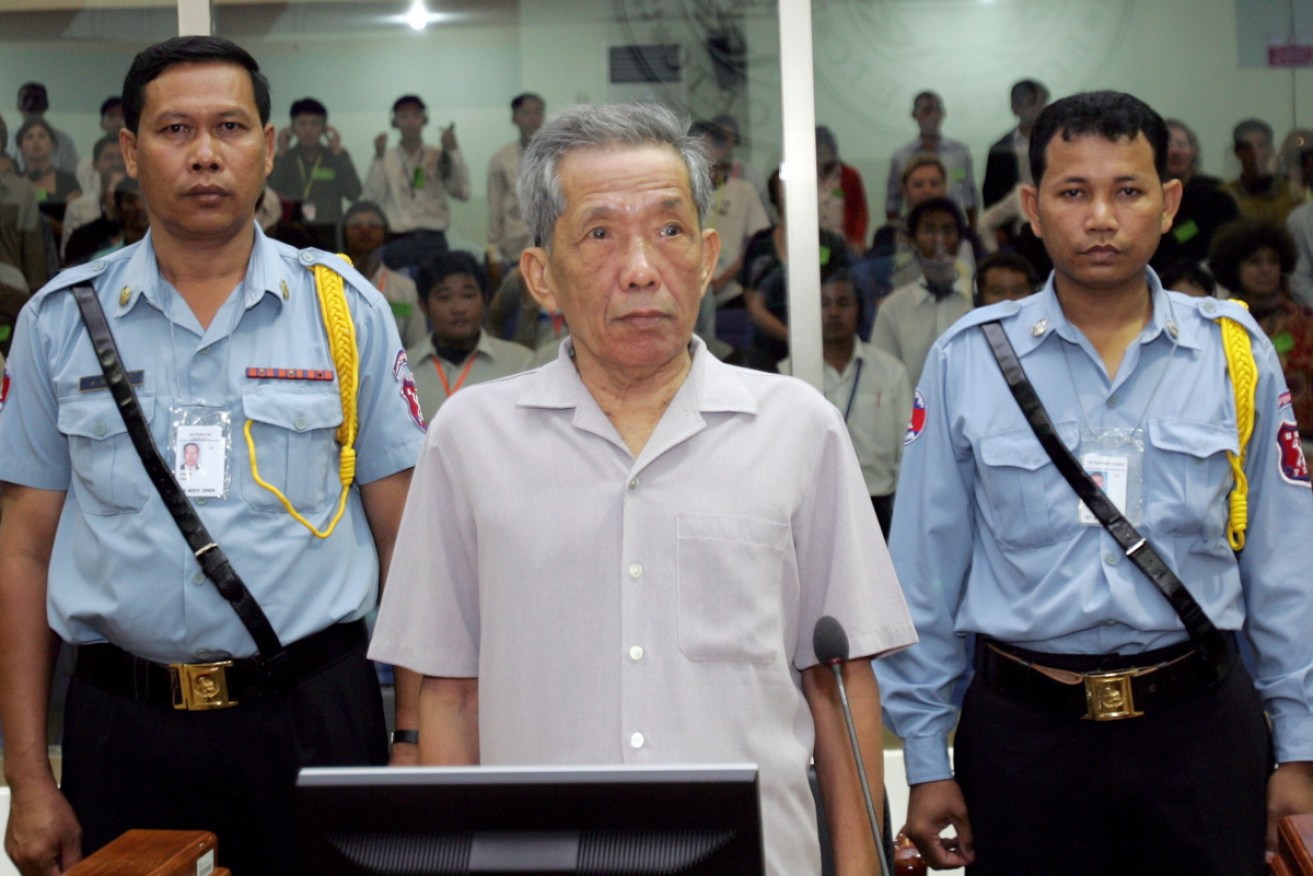Khmer Rouge’s ‘criminally responsible’ chief jailer at S-21, Kaing Guek Eav, dies at 77

Kaing Guek Eav, alias 'Duch', stands in the court room in Phnom Penh, Cambodia in December 2008. Photo: EPA
The Khmer Rouge’s chief jailer, who admitted overseeing the torture and killings of as many as 16,000 Cambodians while running the regime’s most notorious prison, has died aged 77.
Kaing Guek Eav, known as Duch, had been serving a life prison term for war crimes and crimes against humanity.
He died at a hospital in Cambodia early on Wednesday morning, said Neth Pheaktra, a spokesperson for the tribunal in Phnom Penh that handled the trials over the regime’s crimes.
Duch was admitted to Cambodian Soviet Friendship Hospital after developing difficulty breathing on Monday at the Kandal provincial prison, said Chat Sineang, chief of the prison where Duch had been transferred from the tribunal’s prison facility in 2013.
He added that the body would be examined for a cause of death before being handed to his family.
Kaing Guek Eav or ´Duch’, head of the S21 interrogation center has passed away last night in detention. More on the Khmer Rouge trials: https://t.co/1papzQw4w6 pic.twitter.com/OHBSlZ7luX
— John Vink (@vinkjohn) September 2, 2020
Duch, whose trial took place in 2009, was the first senior Khmer Rouge figure to face the UN-backed tribunal that had been assembled to deliver justice for the regime’s brutal rule in the late 1970s, which is blamed for the deaths of 1.7 million people – a quarter of Cambodia’s population at the time.
The communist Khmer Rouge regime that ruled Cambodia from 1975 to 1979 was accused of genocide for causing the deaths of so many of their countrymen from executions, starvation and lack of medical care due to its radical policies.
Only after neighboring Vietnam pushed the Khmer Rouge from power did the scale and barbarity of their rule become absolutely clear.
As commander of the top-secret Tuol Sleng prison code-named S-21, Duch was one of the few ex-Khmer Rouge who acknowledged even partial responsibility for his actions, and his trial included his own wrenchingly graphic testimony of how people were tortured at the prison.
Kaing Guek Eav (alias #Duch), former Chairman of S-21 Security during DK régime passed away at 00:52am on Sept 2 at Khmer Soviet hospital. Duch was found guilty of crimes against humanity and grave breaches of the Geneva Conventions of 1949 #KRT pic.twitter.com/tf1mp5xCGy
— Neth Pheaktra (@pheaktraneth) September 1, 2020
The site in Phnom Penh which had been a secondary school before the Khmer Rouge came to power, is now a museum with stunning evidence of the cruelty with which the Khmer Rouge persecuted even its own members they accused of disloyalty.
Men, women and children seen as enemies of the regime or who disobeyed its orders were jailed and tormented there, and only a handful survived.
“Everyone who was arrested and sent to S-21 was presumed dead already,” he testified in April 2009.
The tribunal since Duch’s trial has convicted two top-echelon Khmer Rouge leaders, while two other defendants died before their trials could be completed. The regime’s No.2 leader Nuon Chea died during his appeals process.
The other whose appeal is under consideration, former head of state Khieu Samphan, almost certainly will be the last one to face trial, due to the Cambodian government’s opposition to any more prosecutions.
The top Khmer Rouge leader, Pol Pot, died in 1998 as a prisoner of his comrades in what had shrunk to a spent force of jungle-based guerrillas.
Torturers under Duch beat and whipped prisoners and shocked them with electrical devices, Duch admitted to the court, but still he denied accounts from survivors and other trial witnesses that he took part in torture and executions himself.
The offspring of detainees were killed to ensure the next generation could not take vengeance.
Duch called himself “criminally responsible” for babies’ deaths but blamed his subordinates for battering the young bodies against trees.
Like many key members of the Khmer Rouge, Duch was an academic before he became a revolutionary. The former math teacher joined Pol Pot’s movement in 1967.
The Khmer Rouge seized power in 1975 and attempted a radical transformation of Cambodia into a peasant society, emptying cities and forcing the population to work on the land in the country they renamed Democratic Kampuchea.
By 1976, Duch was the trusted head of its ultimate killing machine, S-21.








